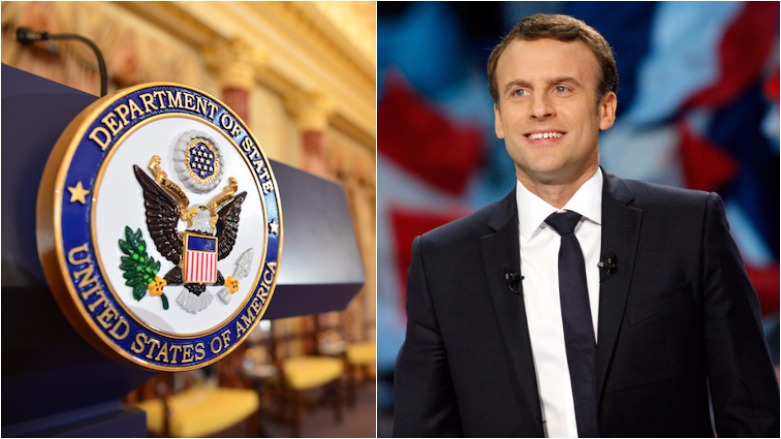US welcomes French mediation between Erbil and Baghdad

WASHINGTON DC, United States (Kurdistan 24) – The US said on Tuesday that it welcomes the mediation of French President Emmanuel Macron in the dispute between Erbil and Baghdad.
Kurdistan 24 asked a senior State Department official if Washington would support French diplomatic efforts should Paris be prepared to become more involved than the US has been in efforts to mediate between the two parties.
“I don’t know what France’s proposal would be, so I would hesitate to comment on that,” this official began cautiously.
But she added, “If France wants to get both sides together and shares the same goals [as the US], then absolutely.”
“If somebody else can get them to the table, and we share the same goals, then that would certainly be a good thing.”
On Monday, US President Donald Trump and French President Emmanuel Macron spoke by phone and “agreed on the need for the Iraqi government and the Kurdistan Regional Government (KRG) to resolve their differences through dialogue,” according to a White House summary of the discussion.
However, Erbil remains extremely frustrated by Baghdad’s failure to enter into such a dialogue and disappointed by the lack of engagement from the international community.
“So far, there have been no talks between the Kurdistan Region and the Iraqi government,” KRG Prime Minister Nechirvan Barzani stated at a press conference on Tuesday.
“There are no technical talks that could lead to more general and comprehensive ones,” he said.
France has been the party most willing to become involved in the dispute between Erbil and Baghdad. On Saturday, Barzani and KRG Deputy Prime Minister Qubad Talabani met in Paris with French president Emmanuel Macron.
The US is loath to pressure Iraqi Prime Minister Haidar al-Abadi as it wants him to win the next elections slated to be held in May.
Whether such US reticence will have much impact on the vote is debatable, but that is, nonetheless, the US position. So Washington urges Baghdad to talk with Erbil but is unwilling to do much to ensure that it actually does.
On Tuesday, Kurdistan 24 asked State Department Spokesperson Heather Nauert whether the US had discussed with Iraqi officials when such talks might begin.
“Those talks would have to be agreed to between the Iraqi central government and also between the Kurds,” she replied. “But we continue to call upon the Government of Iraq to sit down with the Kurds and have a conversation about this.”
“We are willing to certainly help facilitate talks,” Nauert continued, “but we would have to be asked by the governments to do that.”
“Has the Iraqi Government asked you yet?,” Kurdistan 24 responded. “Not to my knowledge,” she replied.
Paul Davis, a former Pentagon analyst dealing with Kurdish affairs, told Kurdistan 24 that given the US reluctance to become seriously involved in mediating between Erbil and Baghdad, “It would be a good idea” if France were to take the lead.
It would be “a very diplomatic way of going about it,” he said.
Davis also suggested that the State Department was too complacent about the prospect of renewed conflict between Iraqi forces and the Kurdish Peshmerga.
“A ceasefire is just that,” he explained. “It means stopping the fighting at a certain point in time. It doesn’t mean there will be no fighting tomorrow or the next day.”
The fighting—particularly given the prominent role of Iranian-backed Shia militias in the Oct. 16 assault on Kirkuk and other disputed areas—has released strong sectarian passions.
Shia extremists are feeling victorious, and “Iran is pushing that,” he said. The area is a “tinderbox,” and some unanticipated event could easily spark a fire.
“A ceasefire is never stable,” Davis noted.
Editing by Nadia Riva
